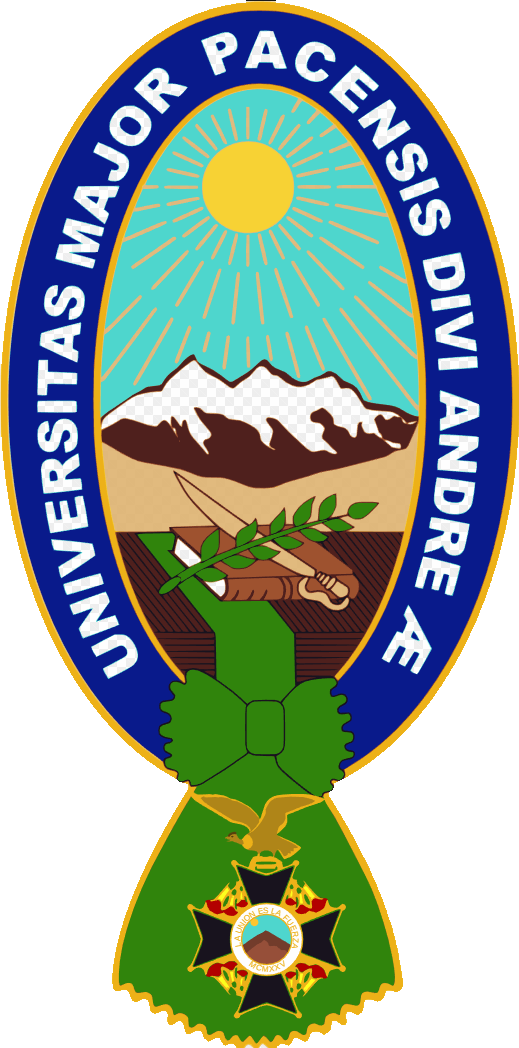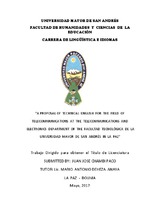Mostrar el registro sencillo del ítem
A proposal of technical english for the field of telecommunications at the telecommunications and electronics department of the Facultad Tecnológica de la Universidad Mayor de San Andrés in La Paz
| dc.contributor.author | Chambi Paco, Juan Jose | |
| dc.date.accessioned | 2017-06-16T22:07:17Z | |
| dc.date.available | 2017-06-16T22:07:17Z | |
| dc.date.issued | 2017-05 | |
| dc.identifier.citation | Trabajo Dirigido | es_ES |
| dc.identifier.uri | http://repositorio.umsa.bo/xmlui/handle/123456789/10807 | |
| dc.description.abstract | This Project is related to the design of an ESP course concerning specialized English teaching for the Telecommunications Department at the Facultad Tecnológica at the Universidad Mayor de San Andres in La Paz, Bolivia. It addressed key notions about ESP and in particular EST. This Guided Work started off with a questionnaire applied to the students which determines the necessity of training the students in the use of the following linguistics skills: reading comprehension of technical texts, specialized vocabulary, translation techniques, and grammar related to the Telecommunications field. This led them to reach an intermediate English level of reading comprehension and an effective translation of articles, books and manuals related to the field. The content is divided into six chapters which describe all the process of the course design.The students’ English level was diverse from beginners to intermediate, and their knowledge on the subject matter. A topical/based-content syllabus was designed based on the students’ needs analysis which takes into account the skills needed to accomplish the course specific objectives. Genre-based instruction with an Input-based approach was the methodology used, which is an exposition to a special kind of language that belongs to a genre called EST for Telecommunications. The priorities in studying the target language are reading and translating. Only the grammar and vocabulary necessary for reading comprehension was taught. The skills employed by the students were the reading techniques such as skimming and scanning and some of the vocabulary learning strategies such as guessing meaning in context, identifying loans and cognates. A grammar guide with examples and exercises was developed for the students as a guided practice which contained grammar examples. As for the types of translations techniques used in this course were the literal, omission, amplification, and modulation. The course went on for one academic semester and the meetings were three times a week with each class lasting three hours. The evaluation and results described an improvement on the four skills. The class was assessed at the beginning of the course with students taking a pre-test for measuring their language skills stated in the objectives. Then two mid-term tests followed in order to measure the student’s progress. Comparing the pre-test with the three tests in progress, in the pre-test the students scored 56.375% and in the progress-test, they scored 68% which shows a great improvement in their technical English competence attaining in this way the planned objectives. This project describes some weaknesses of the course, and suggests the implementation of two ESP courses in the last semesters. | es_ES |
| dc.language.iso | es | es_ES |
| dc.publisher | Universidad Mayor de San Andrés. Facultad de Humanidades y Ciencias de la Educación. Carrera de Lingüística e Idiomas | es_ES |
| dc.subject | COURSE DESIGN | es_ES |
| dc.subject | TELECOMMUNICATIONS FIELD | es_ES |
| dc.subject | READING AND TRANSLATING METHODS | es_ES |
| dc.title | A proposal of technical english for the field of telecommunications at the telecommunications and electronics department of the Facultad Tecnológica de la Universidad Mayor de San Andrés in La Paz | es_ES |
| dc.type | Thesis | es_ES |

